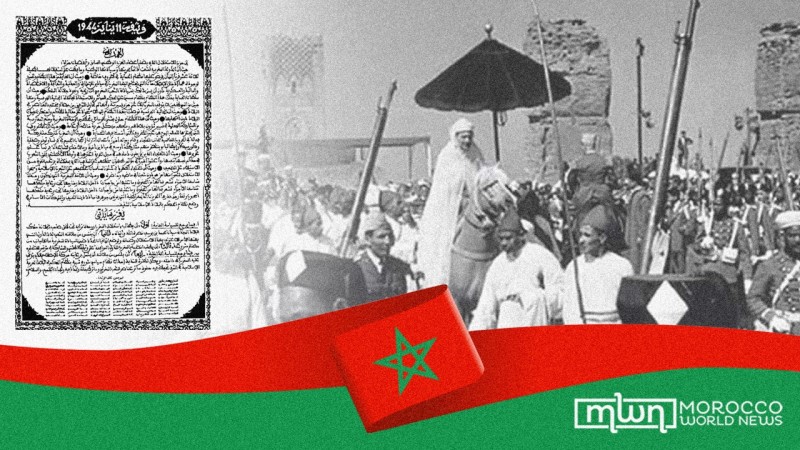Published on January 11, 1944, the Independence Proclamation laid the groundwork for generations of Moroccan nationalist claims against French and Spanish occupation.
Every January 11, Moroccans celebrate Morocco’s Independence Proclamation or the Independence Manifesto, commemorating the bravery of Moroccans who signed a manifesto to urge colonists to leave their Moroccan lands.
On January 11, 1944, dozens of Moroccan nationalists signed the manifesto that called for the country’s full independence and sovereignty over its territories occupied by foreign powers.
A turning point for Moroccan nationalism
Seen as a turning point in Morocco’s history, the proclamation was signed in consultations with the late Sultan Mohammed V, the grandfather of King Mohammed VI, to demand Morocco’s full-throated independence from French and Spanish colonizers.
Following the Sultan’s review, the document was presented to colonial authorities and to the representations of three countries: the US, UK, and the former Soviet Union.
The manifesto documented Morocco’s eagerness to continue its fight against colonizers, stressing the importance of the country’s right to exercise national sovereignty and self-determination.
It also shed light on the strong ties between the throne and the Moroccan people, a sizable majority of whom were ready and eager to sacrifice their lives for their homeland, causing panic among French colonial authorities and troops.
Demonization and oppression campaign
Following the publication of the manifesto, French authorities tried to pressure Sultan Mohammed V into condemning the proclamation. Having failed in their bid to get the Sultan to disown the leaders of Moroccan nationalism, the colonial authorities resorted to organizing a purge and demonization campaign, accusing Moroccan nationalists and intellectuals of spying for Nazi Germany.
Withstanding this campaign of oppression and intimidation from colonial forces, both the Sultan and Moroccan nationalists continued their fierce struggle to defend the country’s legitimate right to independence and self-determination.
In response, French authorities forced the Sultan into exile to Corsica along with his family members on the eve of Eid al-Adha, in August 1953, and then to Madagascar in 1954.
The goal was to shatter Morocco’s dreams of independence, but forcefully exiling their legitimate Sultan only intensified Moroccans’ eagerness for national sovereignty and resilience against colonial oppression.
The decision to send the Sultan to exile was thus greeted with more nationwide uproar and frustration, with waves of nationalist protests demanding the return of the Sultan and his family amid the continued struggle for national independence.
The pressure was strong enough to force French colonizers into agreeing to the return of Sultan Mohammed V to Morocco on November 16.
A few days after his return, the Moroccan delivered a speech announcing the end of the trusteeship and protectorate system and “the advent of freedom of independence.”
The speech was excitedly celebrated across Morocco, laying the groundwork for Moroccan independence from France on March 2, 1956.
That same year, Morocco recovered Tangier and other parts of the northern regions from Spanish rule.
The following years, especially in 1959, 1969, and 1975, Morocco further reclaimed its territorial integrity with the withdrawal of Spain from the Tarfaya, Sidi Ifni, and Saqia al Hamra, and Oued Eddahab regions in the country’s southern provinces.
Continued Struggle
Seven decades after gaining independence from France and nearly five decades after reclaiming its southern provinces from Spanish rule, Morocco’s struggle for independence is still ongoing in the face of separatist challenges in the southern provinces known as Western Sahara.
After Mohammed V passed away, his son, the late King Hassan II, continued the fight for full-fledged territorial integrity. The King famously organized and oversaw the resounding success of one of the most famed milestones of Moroccan nationalism: Al Massira El Khadrae or the Green March in November 1975.
The Green March contributed to the full withdrawal of Spain from southern Morocco after the late monarch made a televised speech calling on Moroccans to mobilize to liberate the Moroccan Sahara.
“We have to do one thing, dear people, and that is to undertake a peaceful march from the north to the east, and from the west to the south. It behooves us to act as one man in order to join the Sahara,” King Hassan II said in his speech.
Thousands of Moroccans were galvanized by the speech and participated in the Green March.
As Morocco celebrated the 47th anniversary of the Green March last year, King Mohammed VI highlighted the importance of the March’s legacy and the critical need for Morocco to fully reclaim its southern provinces.
In his speech on the occasion, King Mohammed VI called on Moroccans of all walks of life to continue to be “faithful to the spirit of the Green March and to its everlasting oath.”
As Moroccan sovereignty continues to be challenged by the Polisario Front, a separatist group financed and armed by Algeria, Moroccans have to remain mobilized and vigilant in order to “defend Morocco’s unity and achieve greater progress,” the monarch stressed.
source/content: moroccoworldnews.com (headline edited)
____________

_____________
MOROCCO